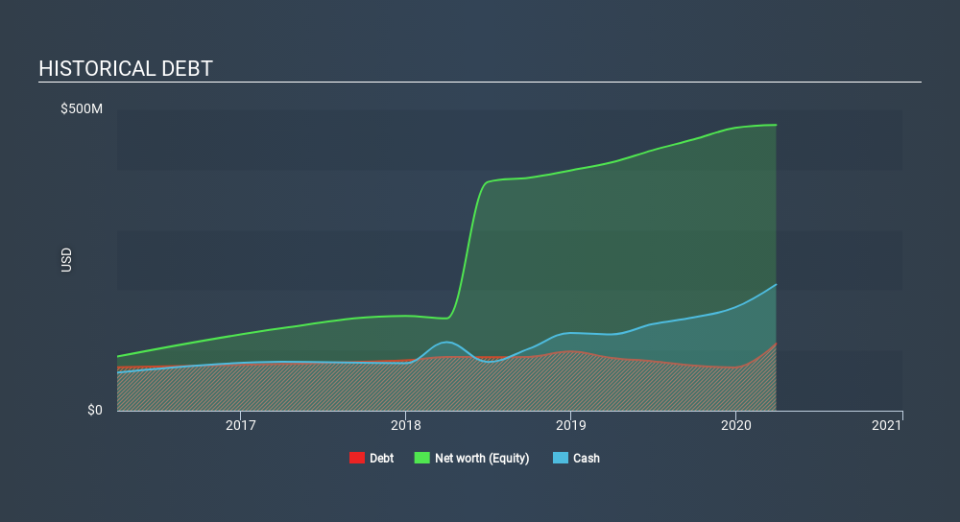Here's Why Skyline Champion (NYSE:SKY) Can Manage Its Debt Responsibly

Some say volatility, rather than debt, is the best way to think about risk as an investor, but Warren Buffett famously said that 'Volatility is far from synonymous with risk'. It's only natural to consider a company's balance sheet when you examine how risky it is, since debt is often involved when a business collapses. As with many other companies Skyline Champion Corporation (NYSE:SKY) makes use of debt. But should shareholders be worried about its use of debt?
When Is Debt Dangerous?
Generally speaking, debt only becomes a real problem when a company can't easily pay it off, either by raising capital or with its own cash flow. If things get really bad, the lenders can take control of the business. While that is not too common, we often do see indebted companies permanently diluting shareholders because lenders force them to raise capital at a distressed price. Having said that, the most common situation is where a company manages its debt reasonably well - and to its own advantage. The first step when considering a company's debt levels is to consider its cash and debt together.
See our latest analysis for Skyline Champion
How Much Debt Does Skyline Champion Carry?
As you can see below, at the end of March 2020, Skyline Champion had US$111.2m of debt, up from US$87.7m a year ago. Click the image for more detail. However, its balance sheet shows it holds US$209.5m in cash, so it actually has US$98.2m net cash.
How Strong Is Skyline Champion's Balance Sheet?
Zooming in on the latest balance sheet data, we can see that Skyline Champion had liabilities of US$186.6m due within 12 months and liabilities of US$120.7m due beyond that. On the other hand, it had cash of US$209.5m and US$45.7m worth of receivables due within a year. So its liabilities total US$52.2m more than the combination of its cash and short-term receivables.
Given Skyline Champion has a market capitalization of US$1.35b, it's hard to believe these liabilities pose much threat. But there are sufficient liabilities that we would certainly recommend shareholders continue to monitor the balance sheet, going forward. While it does have liabilities worth noting, Skyline Champion also has more cash than debt, so we're pretty confident it can manage its debt safely.
Although Skyline Champion made a loss at the EBIT level, last year, it was also good to see that it generated US$90m in EBIT over the last twelve months. When analysing debt levels, the balance sheet is the obvious place to start. But ultimately the future profitability of the business will decide if Skyline Champion can strengthen its balance sheet over time. So if you're focused on the future you can check out this free report showing analyst profit forecasts.
Finally, a company can only pay off debt with cold hard cash, not accounting profits. While Skyline Champion has net cash on its balance sheet, it's still worth taking a look at its ability to convert earnings before interest and tax (EBIT) to free cash flow, to help us understand how quickly it is building (or eroding) that cash balance. Over the most recent year, Skyline Champion recorded free cash flow worth 68% of its EBIT, which is around normal, given free cash flow excludes interest and tax. This free cash flow puts the company in a good position to pay down debt, when appropriate.
Summing up
We could understand if investors are concerned about Skyline Champion's liabilities, but we can be reassured by the fact it has has net cash of US$98.2m. And it impressed us with free cash flow of US$61m, being 68% of its EBIT. So is Skyline Champion's debt a risk? It doesn't seem so to us. The balance sheet is clearly the area to focus on when you are analysing debt. But ultimately, every company can contain risks that exist outside of the balance sheet. For instance, we've identified 2 warning signs for Skyline Champion (1 is potentially serious) you should be aware of.
Of course, if you're the type of investor who prefers buying stocks without the burden of debt, then don't hesitate to discover our exclusive list of net cash growth stocks, today.
This article by Simply Wall St is general in nature. It does not constitute a recommendation to buy or sell any stock, and does not take account of your objectives, or your financial situation. We aim to bring you long-term focused analysis driven by fundamental data. Note that our analysis may not factor in the latest price-sensitive company announcements or qualitative material. Simply Wall St has no position in any stocks mentioned.
Have feedback on this article? Concerned about the content? Get in touch with us directly. Alternatively, email editorial-team@simplywallst.com.

